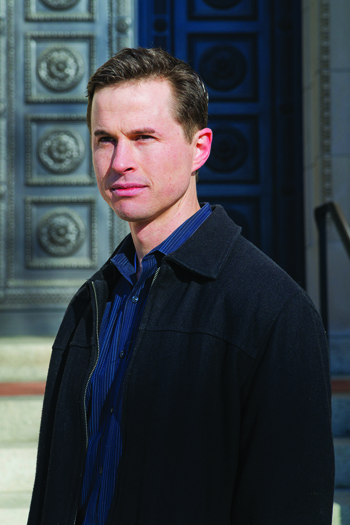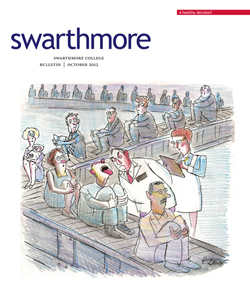Monitoring Misinformation
Media critic Brendan Nyhan ’00 provides a reality check against pundits’ political spin

“It’s a niche commentary I provide,” says Brendan Nylan ’00, who’s aim is to redress media misfires. Photo by Eli Burak
With the general election just around the corner, political scientist and blogger Brendan Nyhan ’00 is trying to address media misinformation by helping journalists do a more accurate job of reporting.
The presidential-campaign season is a particularly important time for journalists to have the tools and understanding to provide their own reality checks, says the assistant professor for Dartmouth College’s Department of Government. In general, as a political scientist he has found that there is strong journalistic incentive to exaggerate electoral significance of speeches, debates and gaffes, which don’t live up to claims of importance.
“I hope that I’ve helped play some small role in changing the conventional wisdom among younger political writers,” he explains. According to an opinion column by Francis Wilkinson on Bloomberg.com, Nyhan is “creating reputational hazards [for] seat-of-the-pants punditry.”
In the March research report that he co-authored for the New America Foundation Media Policy Initiative, “Misinformation and Fact-checking: Research Findings from Social Science,” Nyhan explains why it is so difficult, if not impossible, for the press to correct misperceptions.
“In part, people’s evaluations of new information are shaped by their beliefs. When we encounter news that challenges our views, our brains may produce a variety of responses to compensate for this unwelcome information. As a result, corrections are sometimes ineffective and can even backfire. … Trying to correct a false claim with a negation (e.g., ‘John is not a criminal’) can also lead people to more easily remember the claim you are trying to negate (‘John is a criminal’).
Candidates and supporters who are politically savvy know how difficult it is to fact check them in a “he said/she said” brand of journalism, according to Nyhan. “When the media report two sides without ascertaining the ‘truth,’ the incentive to be accurate is lower” for the politicians providing the quotes.
This is why Nyhan says that a large part of the media’s role should be “naming and shaming” as a way to provide “reputational checks” on politicians.
His primary focus as a political scientist isn’t a candidate’s policies, but he does worry that “the pace of the current news cycle is crowding out more policy information than usual. … The irony of this is that political events are covered as meaningful and policy as cheap talk.”
Nyhan has been working to help journalists by studying misinformation and all its implications since 2001, when he co-founded the website Spinsanity as an online nonpartisan watchdog of political spin, then as co-author of the 2004 book All the President’s Spin, which grew out of the website. He and his co-editors discontinued Spinsanity in 2005.
An honors political science major with a minor in economics at Swarthmore, he studied misinformation in health care as a Robert Wood Johnson Scholar in Health Policy Research at the University of Michigan from 2009 to 2011.
For the current election cycle, he offers nearly daily critiques of campaign news from a political scientist’s point of view at www.brendan-nyhan.com. His media critiques frequently are cross-posted at HuffPost Pollster and Washington Monthly’s Ten Miles Square blog. He also Tweets at @BrendanNyhan and serves as New Hampshire campaign correspondent for the Columbia Journalism Review.
 Email This Page
Email This Page